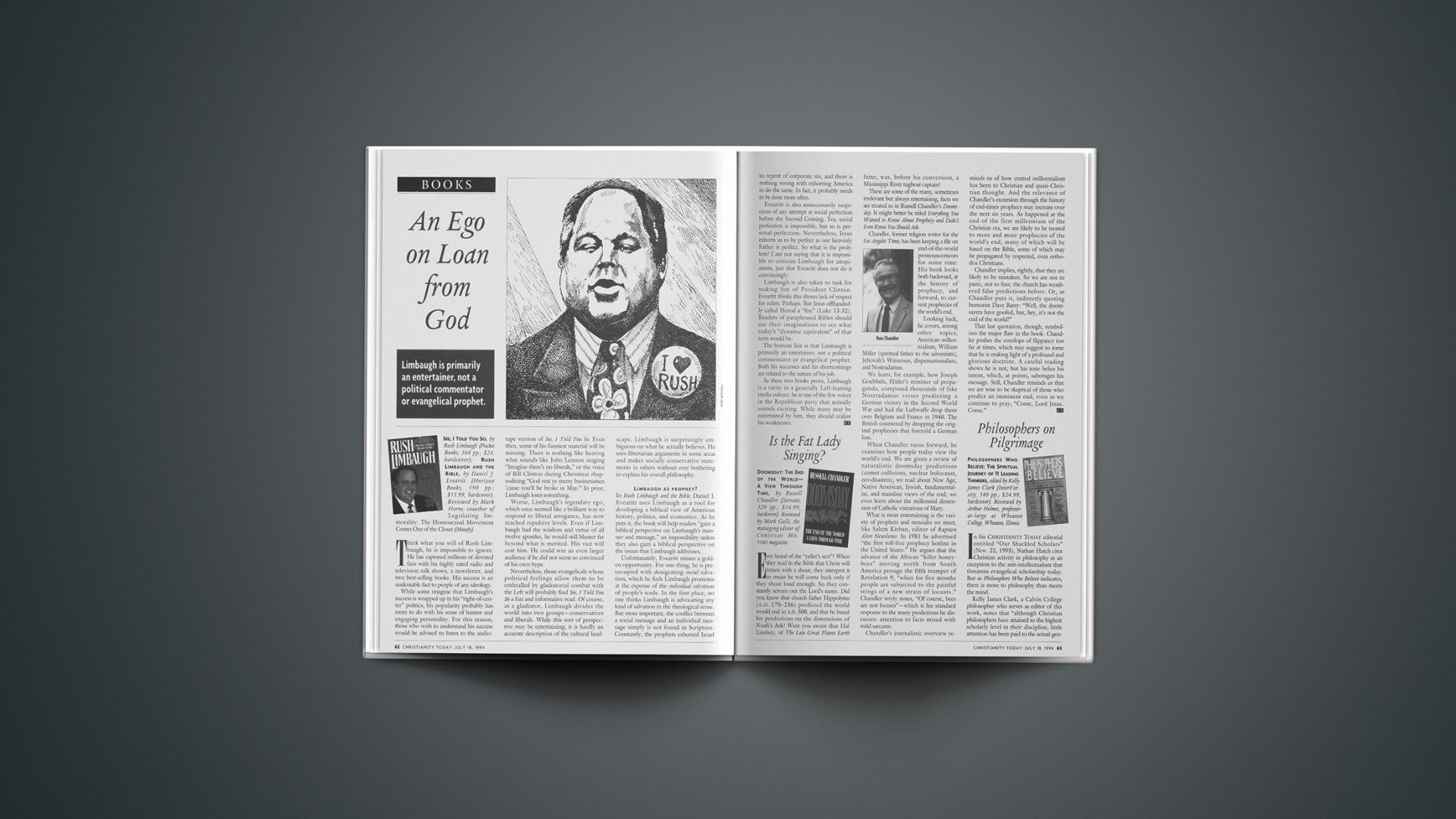"See, I Told You So," by Rush Limbaugh (Pocket Books, 364 pp.; $24, hardcover); "Rush Limbaugh and the Bible", by Daniel J. Evearitt (Horizon Books, 190 pp.; $15.99, hardcover). Reviewed by Mark Horne, coauthor of "Legislating Immorality: The Homosexual Movement Comes Out of the Closet" (Moody).
Think what you will of Rush Limbaugh, he is impossible to ignore. He has captured millions of devoted fans with his highly rated radio and television talk shows, a newsletter, and two best-selling books. His success is an undeniable fact to people of any ideology.
While some imagine that Limbaugh's success is wrapped up in his "right-of-center" politics, his popularity probably has more to do with his sense of humor and engaging personality. For this reason those who wish to understand his success would be advised to listen to the audiotape version of "See, I Told You So." Even then, some of his funniest material will be missing. There is nothing like hearing what sounds like John Lennon singing "Imagine there's no liberals," or the voice of Bill Clinton during Christmas rhapsodizing "God rest ye merry businessmen 'cause you'll be broke in May." In print, Limbaugh loses something.
Worse, Limbaugh's legendary ego, which once seemed like a brilliant way to respond to liberal arrogance, has now reached repulsive levels. Even if Limbaugh had the wisdom and virtue of all twelve apostles, he would still bluster far beyond what is merited. His vice will cost him. He could win an even larger audience if he did not seem so convinced of his own hype.
Nevertheless, those evangelicals whose political feelings allow them to be enthralled by gladiatorial combat with the Left will probably find "See, I Told You So" a fun and informative read. Of course, as a gladiator, Limbaugh divides the world into two groups—conservatives and liberals. While this sort of perspective may be entertaining, it is hardly an accurate description of the cultural landscape. Limbaugh is surprisingly ambiguous on what he actually believes. He uses libertarian arguments in some areas and makes socially conservative statements in others without ever bothering to explain his overall philosophy.
LIMBAUGH AS PROPHET?
In "Rush Limbaugh and the Bible," Daniel J. Evearitt uses Limbaugh as a tool for developing a biblical view of American history, politics, and economics. As he puts it, the book will help readers "gain a biblical perspective on Limbaugh's manner and message," an impossibility unless they also gain a biblical perspective on the issues that Limbaugh addresses.
Unfortunately, Evearitt misses a golden opportunity. For one thing, he is preoccupied with denigrating social salvation, which he feels Limbaugh promotes at the expense of the individual salvation of people's souls. In the first place, no one thinks Limbaugh is advocating any kind of salvation in the theological sense. But more important, the conflict between a social message and an individual message simply is not found in Scripture. Constantly, the prophets exhorted Israel to repent of corporate sin, and there is nothing wrong with exhorting America to do the same. In fact, it probably needs to be done more often.
Evearitt is also unnecessarily suspicious of any attempt at social perfection before the Second Coming. Yes, social perfection is impossible, but so is personal perfection. Nevertheless, Jesus exhorts us to be perfect as our heavenly Father is perfect. So what is the problem? I am not saying that it is impossible to criticize Limbaugh for utopianism, just that Evearitt does not do it convincingly.
Limbaugh is also taken to task for making fun of President Clinton. Evearitt thinks this shows lack of respect for rulers. Perhaps. But Jesus offhandedly called Herod a "fox" (Luke 13:32). Readers of paraphrased Bibles should use their imaginations to see what today's "dynamic equivalent" of that term would be.
The bottom line is that Limbaugh is primarily an entertainer, not a political commentator or evangelical prophet. Both his successes and his shortcomings are related to the nature of his job.
As these two books prove, Limbaugh is a rarity in a generally Left-leaning media culture; he is one of the few voices in the Republican party that actually sounds exciting. While many may be entertained by him, they should realize his weaknesses.
Mark Horne is coauthor of "Legislating Immorality: The Homosexual Movement Comes Out of the Closet" (Moody).
Copyright © 1994 Christianity Today. Click for reprint information.
ctjul94mrw4T80185619










